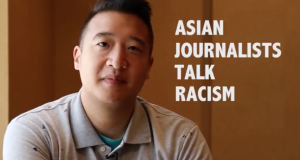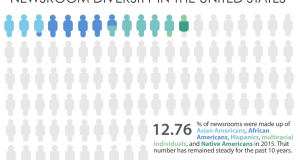Most people don’t associate the word “quiet” with S. Mitra Kalita.
The 39-year-old Indian American is known for her bold and splashy ideas — from hiring a Black Twitter reporter to sending a Taylor Swift fan who happens to be an L.A. Times metro reporter to cover the country superstar’s concert.
She’s been listed in the Observer’s “10 Players in Media You Must Hire” and was recently named CNN Digital’s vice president of programming. But feeling confident enough to say what was on her mind took decades of coaching and pushing herself to pitch at least three ideas before she could eat lunch.
“If you’re not comfortable speaking up and fighting for your story ideas, you get left behind,” Kalita said.
Asian American journalists like Kalita are landing more prominent newsroom leadership roles in recent years, but some say they still face a bamboo ceiling — a barrier where they must shatter stereotypes of being seen as submissive and often are the only people representing their communities in the boardroom.
Asian American women represent just 1.6 percent of newsroom staffs, according to the Women’s Media Center, and they get paid less than other staffers, including Asian American males, according to a recent survey of Dow Jones employees. And when it comes to leadership, there are few Asian American female editors at the top.
Sharon Pian Chan, a deputy managing editor at The Seattle Times, says that needs to change.
“Younger audiences have grown up in a fairly diverse world,” Chan said. “If you’re showing them on your front page a monolithic white world that looks like the 1950s, your product is not going to be relevant to that audience.”
After the 2008 financial crisis, many newsrooms put diversity on the back burner because they had to prioritize monetization to stay alive, Chan said. What many leaders in the media industry fail to realize is that making money and enhancing diversity should not be in conflict with each other, she added.
When the San Francisco Chronicle ran a story about ethnic study programs in colleges, Kristen Go, a managing editor, said she felt the story was written with a “white point of view,” with no sources that were people of color.
“I brought it up in the news meeting, and people didn’t feel comfortable with me talking about race,” she said. But she felt it was important to bring awareness to the issue.
Go said she is making great efforts to diversify the newsroom—something that cannot be said of every media executive. Minorities made up 19% of the Chronicle’s staff in 2015, higher than the national average of 12.8%, according to the American Society of News Editors.
But in order to get to her position, it took more than just excelling at her job, Go said. She rose through the ranks because she actively communicated her goals and aspirations to her superiors, she added.
“Don’t assume that just because you’re doing a good job, someone will tap on your shoulder and say ‘I want to promote you’,” she advised. “Sometimes we as women or as Asians don’t always speak up for ourselves.”
Although some see being Asian American and female — a double minority status — as a disadvantage, it is in fact an advantage that is often not valued enough, said Leezel Tanglao, an assistant managing editor at CNNMoney.
Her proudest story was one that highlighted the contribution of Filipino farm workers in California to the United Farm Workers movement, a slice of U.S. labor history that is often forgotten. Tanglao’s background as a Filipina American and passion for the issue helped her obtained access to the relatives of the farm workers and historians. The result was an authentic, well-rounded story.
“Thinking about your unique experiences and the connections you have informs the writing process,” Tanglao said.
 VOICES Publishing from the AAJA National Convention
VOICES Publishing from the AAJA National Convention








